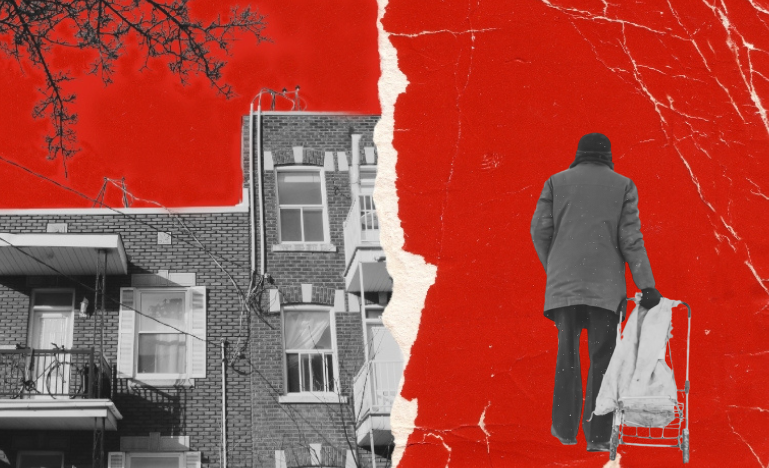Help for those without stable housing
Legal clinics nationwide are addressing the homelessness crisis.

Amid rising rates of housing insecurity, legal clinics across Canada are stepping up to support the unhoused population. "Having stable housing is an absolutely fundamental part of people's ability to live a healthy life and be a full member of society," says Mark Culligan, a community legal worker with Dalhousie Legal Aid Service in Halifax.
Without stable housing, maintaining family and educational stability for children becomes a challenge, he says. People struggle to maintain relationships with healthcare and service providers and participate to any degree in the administrative state.
Danielle Magnifico is the legal director at the Legal Help Centre of Winnipeg, Inc., where law students work alongside social work students. She says they take a holistic approach to assisting marginalized clients experiencing legal issues, as there are interconnected issues "such as housing and food security" that all need to be addressed to help them.
When Donald Tremblay founded the Mobile Legal Clinic in Montreal ten years ago, he did not anticipate the demand he sees today.
The Mobile Legal Clinic, also known as the Clinique juridique itinérante, assists marginalized people by offering legal information and accompanying clients when they meet with lawyers or attend court hearings. "A lot of homeless people have legal problems, and they don't know how to address them," he says.
As part of the Mobile Legal Clinic, law students from the Université de Montréal, the Université du Québec à Montréal, McGill University, and Université Laval travel to homeless shelters or day centres to offer their services.
"We meet the clients in their environment and help them navigate the legal system," says Tremblay, the clinic's director general.
Tremblay adds that marginalized individuals often become entangled in the criminal justice system due to the challenges associated with homelessness. "It's a systemic problem."
He says they tend to get charged with various offenses, however minor, simply because they are present in public spaces. "The most common crime they are accused of is breach of probation, and the second is breach of conditions — those make up more than half of the crimes," he says.
Requirements to refrain from alcohol or drug use or to avoid specific areas of the city can result in repeated violations. "Of course they will still go there. That is where their community is," says Tremblay.
According to Megan Longley, K.C., the executive director of Dalhousie Legal Aid Service, housing insecurity might prompt community services to intervene and take custody of someone's children due to parenting concerns. "It also leads to remands for people who otherwise would be released because they can't put an address forward. So we have jails across the country filled with people who are not violent offenders that don't have an alternative to jail."
One of the many issues Dalhousie Legal Aid Service handles is landlord-tenant disputes. Often tenants face dishonest landlords, but don't know their legal rights or entitlements, says Longley. "If people don't get legal help, they may simply give up and say, 'OK, I'll leave,' when maybe they didn't need to."
Complicating matters is a lack of an enforcement mechanism in residential tenancy law, she adds. "It's very hard to hold landlords accountable if they are not following the law properly, especially after the fact."
Culligan says he has met several clients who were evicted within the past year and are now sleeping in tents. "They were removed without a proper legal proceeding supporting that eviction and now it's too late to do something," he says. "Landlords just run roughshod over the law because they know that in the vast majority of cases, they can do so with impunity."
It's an ongoing problem in residential tenancy, he says. Wrongfully evicted tenants often back off from exercising their legal rights. "They are afraid. There is an imbalance of power, especially in the current market. They don't feel comfortable accessing the system," he says.
Sometimes, if the clinic gets wind of a landlord terminating a tenancy, allegedly due to renovations, it can work proactively. "If it's a renoviction that on the face doesn't seem to be legal, we try to connect with the whole apartment building if they are in the same situation. If we can disseminate information earlier, sometimes we can ward off a whole series of residential tenancy hearings," she says.
"The earlier you can talk to a person about the system, the more rights and options you can give them. That helps people access justice," says Culligan.
The important thing is to show compassion when dealing with insecurely housed people, says Chris Heslinga, the director of the Law Centre and professor at the University of Victoria. "It's not their fault they are in this situation and have these difficulties," he says.
The Law Centre assists with criminal matters, family law, landlord and tenant disputes and many other issues. "There is never a lack of demand for our services," says Heslinga.


